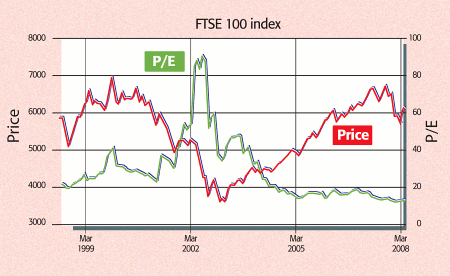
“We are on the cusp of an equity meltdown that will shred and slash portfolios like Freddie Kreuger,” says Société Générale’s Albert Edwards in a recent note. “We are not through the worst of this crisis. The worst is still to come.”
The legendarily bearish strategist recommends investors cut global equity exposure in their portfolios to 30%, with 50% in AAA-rated government bonds – a bet, says Ambrose Evans-Pritchard in The Daily Telegraph, “on gruelling ‘Japanese’ deflation”.“This truly is the stuff of sandwich boards and loud hailers – a message that the end is nigh,” says Paul Murphy on FT.com’s Alphaville.
Still, from Edwards, that’s no surprise – he has “ploughed a lonely furrow” over the past decade, says The Economist. “He turned bearish on the stockmarket more than 10 years ago, just before the dotcom boom that took share prices into the stratosphere.” Still, for investors who took his advice on a long-term view, the result hasn’t been bad – equities have (just) been outperformed by government bonds.
The core of Edwards’s argument is that stockmarkets are entering an “ice age”, in which the prospect of slow earnings growth will lead to a decline in valuations. In essence, he expects low inflation or deflation – partly the result of the credit crunch – to mean lower nominal earnings growth going forward and a steady decline in p/e ratios as investors adjust to this new world. Japan is the template – “the comparison … is uncanny”, says Edwards.
This could lead to a brutal bear market. “We expect global equity prices to fall by up to 75% from their peaks as a deep global economic downturn unfolds over the next few years,” he says. “The credit bubbles which sustained economic bubbles in many countries (especially the US, UK and Spain of the majors) will suffer badly from The Great Unwind as inevitably as night follows day.”
Edwards’s views are a long way from the mainstream, but although his thesis hasn’t yet been proved right, it isn’t clearly wrong either. Often unremarked upon amid the earnings-driven bull market, “equities have been de-rating for several years”, says The Economist (see chart, above). “Who is to say that the process has stopped?”